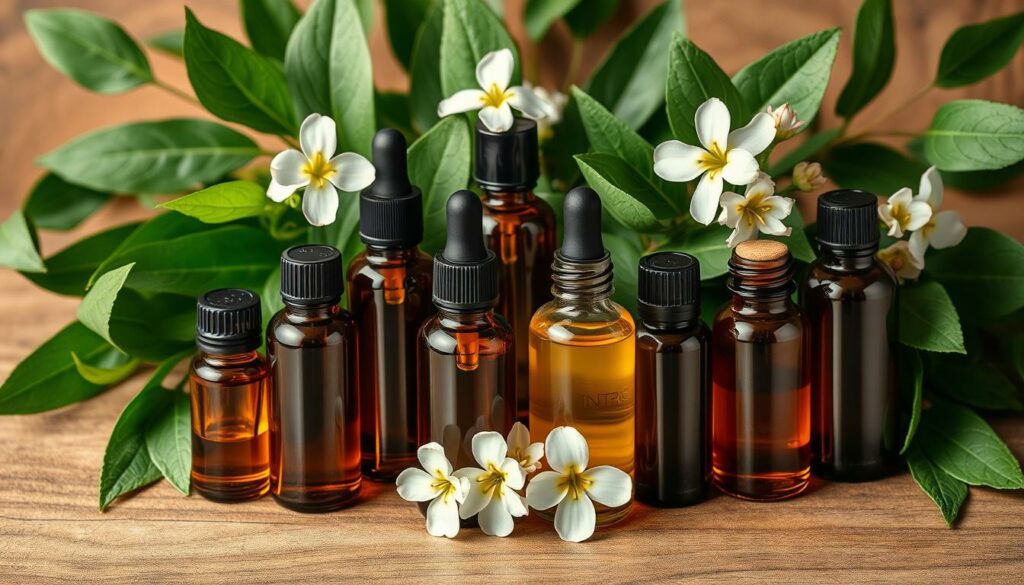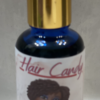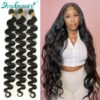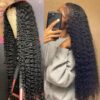Boost Hair Growth with 7 Essential Oils
Are you searching for natural ways to get healthier, fuller hair? Essential oils have been around for centuries to help hair grow and stay healthy. These plant extracts are full of nutrients that can make your scalp blood flow better, strengthen hair roots, and make your hair look alive.
Adding these 7 essential oils for hair growth to your hair care routine can really help. In this article, we’ll dive into the benefits of these natural remedies. We’ll also show you how to use them to get the hair you’ve always wanted.
Get ready to see how essential oils can change your hair’s health and growth. From favorites like lavender and peppermint to hidden gems like cedarwood and jojoba, these oils have lots of benefits. Keep reading to find out how to use them to naturally boost your hair growth.
The Power of Essential Oils for Healthy Hair
Essential oils are a game-changer for healthy hair and growth. They come from plants and are packed with vitamins, minerals, and antioxidants. Adding them to your hair care routine can nourish your hair deeply.
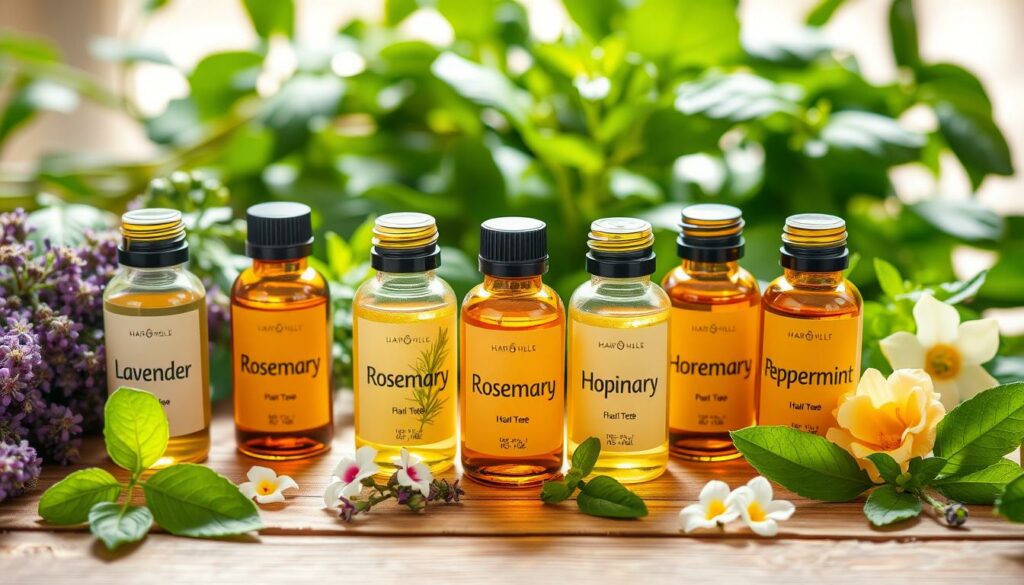
Essential oils differ from synthetic products because they work with your body. Unlike harsh chemicals, they nourish the hair and scalp. A recent study shows their importance and the need for dermatologists to know about them.
Using essential oils regularly can change your hair’s health and look. They strengthen hair follicles, improve scalp circulation, and protect against damage. With consistent use, you’ll get the healthy, luscious hair you’ve always wanted.
Embrace the power of essential oils and see how they can change your hair. Say goodbye to dull hair and hello to healthy, vibrant locks. Next, we’ll look at the best essential oils for hair growth and how to use them.
Understanding the Causes of Hair Loss and Slow Growth
To tackle hair loss and slow growth, knowing the causes is key. By pinpointing the reasons, you can start steps to improve your hair health. This leads to stronger, faster-growing hair.
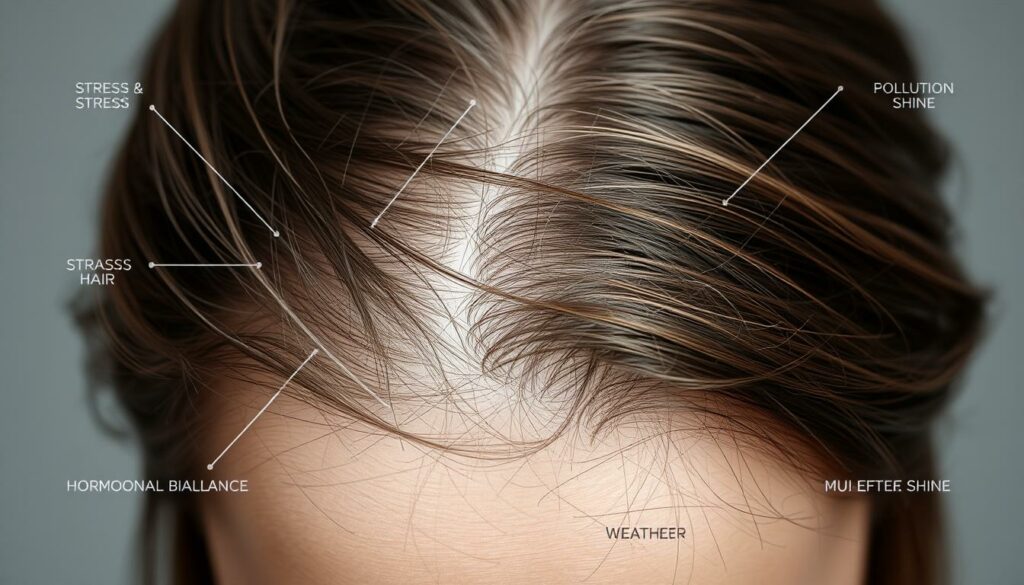
Genetics and Hormonal Factors
Genetics shape your hair growth and risk of loss. Conditions like androgenetic alopecia can cause thinning. Hormonal changes, like those in menopause, can also affect hair growth.
Nutritional Deficiencies and Poor Hair Care
Your hair needs a balanced diet for strength. Lack of nutrients like biotin and vitamins A, C, and E weakens hair. Bad hair care, like heat styling, can also damage hair.
Stress and Environmental Damage
Stress harms your health, including your hair. It can lead to excessive shedding. Pollution and UV rays also damage hair. Managing stress and protecting your hair from the environment helps.
7 Essential Oils For Hair Growth
Looking to grow your hair longer and healthier? Essential oils can be a game-changer. We’ve found the top 7 essential oils for hair growth. They strengthen hair follicles, improve scalp circulation, and balance sebum production. They also fight common scalp problems like dandruff.
Argan oil is first on our list. It’s from the argan tree in Morocco and is full of vitamin E and fatty acids. It deeply nourishes and moisturizes your hair, making it soft, shiny, and strong against damage. Rosemary essential oil is also great for hair growth. It boosts blood flow to the scalp, helping hair follicles stay healthy and reducing hair loss.
Peppermint oil is refreshing and invigorating. It wakes up the scalp and encourages hair growth. Its cooling effect increases blood flow to hair follicles, giving them the nutrients they need. Cedarwood oil helps balance sebum in the scalp. This prevents dryness and oiliness that can slow down hair growth.
Lavender oil is soothing and calming for sensitive scalps. It has anti-inflammatory properties that reduce irritation and promote a healthy scalp. Tea tree oil fights dandruff, itchiness, and other scalp issues that can slow hair growth.
Jojoba oil is nourishing and versatile. It moisturizes and strengthens hair, preventing breakage and promoting growth. It’s also a good carrier oil for mixing with other essential oils.
Using these 7 essential oils can nourish and support your hair for growth. In the next sections, we’ll explore each oil’s benefits and how to use them for the best hair growth results.
How to Use Essential Oils for Maximum Hair Growth
To get the most out of essential oils for hair growth, you need to use them right. Follow these easy steps to make sure your scalp and hair soak up the good stuff. This will help your hair grow faster and healthier.
Mixing with Carrier Oils
Essential oils are very strong and need to be mixed with a carrier oil to avoid skin problems. Good carrier oils for hair include coconut oil, jojoba oil, and sweet almond oil. They help spread the essential oils safely and add extra moisture and nutrients.
To make a hair growth mix, blend 2-3 drops of essential oil with 1 tablespoon of carrier oil. Massage this mix into your scalp and hair, focusing on the roots. Leave it on for at least 30 minutes, or even better, overnight for extra conditioning. Then, wash your hair as you normally would.
Scalp Massage Techniques
Adding scalp massage to your hair care routine can really help essential oils work better. Massaging your scalp boosts blood flow, gets nutrients to your hair follicles, and spreads the oils evenly.
To do a scalp massage, put your essential oil and carrier oil mix on your fingertips. Use gentle, circular motions to massage it into your scalp for 5-10 minutes. Make sure to cover your whole scalp, especially where hair growth is slower. This not only helps your hair grow but also relaxes you.
Frequency and Duration of Application
How often and how long you use essential oils depends on your hair type and needs. Most people see good results by using them 2-3 times a week. But if your hair is very dry or damaged, you might need to use them more often.
Being consistent is important when using essential oils for hair growth. Stick to a regular routine for at least 2-3 months to see real changes. With time, you should notice your hair getting thicker, stronger, and healthier. Remember, growing healthy hair takes time and effort.
Argan Oil: The Moroccan Secret for Lustrous Locks
Discover the power of argan oil, a Moroccan secret for achieving lustrous locks. This precious oil comes from the kernels of the argan tree native to Morocco. It’s known for its nourishing properties that can make your hair vibrant and full of life.
Argan oil is a potent hair moisturizer. It’s packed with vitamin E, essential fatty acids, and antioxidants. These nutrients deeply nourish your hair, making it soft, supple, and manageable.
Argan oil is great for taming frizz and smoothing out unruly hair. It works wonders on curly or wavy hair prone to frizz. A small amount can seal in moisture, reduce frizz, and enhance shine.
Argan oil also prevents split ends and protects hair from heat styling tools. It forms a protective barrier against the heat of blow dryers, flat irons, and curling wands. For best results, apply a few drops before styling, focusing on the ends and mid-lengths.
Using argan oil in your hair care routine is easy. You can use it as a pre-shampoo treatment or add it to your conditioner. It’s also great as a leave-in treatment on damp hair. For more tips on reducing frizz in curly hair, check out this informative article from Hair Candy Beauty.
Experience the transformative power of argan oil. Unlock the secret to lustrous, healthy-looking locks. Embrace this Moroccan treasure and let your hair shine with unparalleled radiance and beauty.
Rosemary Essential Oil: Stimulating Scalp Circulation
Rosemary essential oil is a powerful tool for healthy hair growth. It has been used for centuries to boost scalp circulation. This is key for getting nutrients and oxygen to your hair follicles.
By improving blood flow, rosemary oil can make your hair thicker, fuller, and more vibrant.
Benefits of Rosemary for Hair Health
Rosemary essential oil does more than just improve circulation. It also prevents premature graying, strengthens hair strands, and fights dandruff. Adding it to your hair care routine can make your hair healthier and more resilient.
It’s also great for stimulating hair growth. This makes it perfect for those fighting thinning hair or slow growth. Rosemary oil nourishes hair follicles and promotes a healthy scalp, leading to the lush hair you desire.
DIY Rosemary Hair Mask Recipe
Want to try rosemary essential oil for yourself? Here’s a simple DIY hair mask recipe for a spa-like experience at home:
1. Mix 2 tablespoons of your favorite carrier oil (like jojoba or coconut oil) with 5-7 drops of rosemary essential oil.
2. Apply the mix to your scalp and massage gently for 5-10 minutes.
3. Keep it on for 30 more minutes, then rinse with warm water and shampoo as usual.
4. Do this once or twice a week for the best results.
Using this rosemary hair mask regularly can lead to the healthy, gorgeous hair you’ve always wanted. So, start using rosemary essential oil today and see your hair change for the better!
Peppermint Oil: Cool Freshness for Hair Follicles
Peppermint oil is more than a refreshing scent in hair care. It comes from peppermint leaves and has a cooling effect. This effect can help your scalp and hair follicles.
The menthol in peppermint oil stimulates your scalp. It increases blood flow, bringing more nutrients to your hair follicles. This makes your hair grow stronger and healthier.
Peppermint oil also helps clear hair follicles. It removes excess sebum, product buildup, and dead skin cells. This allows your hair to grow better and prevents scalp problems.
Peppermint oil has antimicrobial properties. These help keep your scalp healthy, reducing the chance of infections. Infections can slow down hair growth.
To use peppermint oil, add a few drops to your shampoo or conditioner. Or mix it with a carrier oil like jojoba or coconut oil for a scalp massage. Massage it into your scalp, focusing on thinning or hair loss areas. The peppermint oil’s cooling effect will refresh you while stimulating your scalp.
Regular use of peppermint oil can make your hair thicker and healthier. Enjoy the refreshing feeling it gives while boosting your hair growth.
Cedarwood Oil: Balancing Sebum Production
Finding the right balance of natural oils in your scalp is key for healthy hair growth. Cedarwood oil is a powerful ally for your hair care routine. It regulates sebum production, creating an optimal environment for your hair to thrive.
Sebum, the natural oil from your scalp, keeps your hair moisturized and protected. But, an imbalance in sebum production can cause problems. Too much sebum leads to oily, greasy hair and clogged follicles, slowing down hair growth. Too little sebum causes a dry, flaky scalp that’s tight and uncomfortable.
How Cedarwood Oil Promotes Healthy Hair Growth
Cedarwood oil is great for promoting healthy hair growth by balancing sebum production. It regulates the sebaceous glands, ensuring your scalp produces the right amount of natural oils. This keeps your hair nourished and vibrant.
Cedarwood oil also has antiseptic and anti-inflammatory qualities. These make it excellent for fighting scalp conditions like dandruff, itchiness, and inflammation. It soothes the scalp and promotes a healthy environment for hair follicles, leading to stronger, healthier hair growth.
To use cedarwood oil in your hair care routine, mix a few drops with your favorite carrier oil like jojoba or coconut oil. Massage it gently into your scalp. You can also find shampoos, conditioners, and hair masks with cedarwood oil. Regular use will lead to a more balanced scalp, reduced oiliness or dryness, and better hair health and appearance.
Lavender Oil: Soothing Stressed Scalps and Strands
Lavender oil is a treasure for those with stressed scalps and weak hair. It calms irritated scalps and reduces inflammation. This makes it perfect for growing healthy hair.
Lavender oil is also great for strengthening hair strands. It minimizes breakage and boosts hair health. Adding it to your hair care routine can help reduce stress and prevent hair loss.
To use lavender oil, mix a few drops with your shampoo or conditioner. Or, make a DIY hair mask with lavender oil and a carrier oil like jojoba or coconut oil. Massage it into your scalp and hair for soothing benefits. Regular use can strengthen hair, reduce irritation, and bring calm.
Give your stressed scalp and hair the care they need with lavender oil. Its calming scent and hair-strengthening properties make it essential for healthy, shiny hair.
Tea Tree Oil: Fighting Dandruff and Itchiness
Struggling with dandruff and an itchy scalp? Tea tree oil might be the answer. It’s known for fighting scalp problems and helping hair grow strong.
Tea Tree Oil’s Antifungal Properties
Tea tree oil is famous for its strong antifungal and antibacterial powers. It’s great at fighting fungi like Malassezia that cause dandruff. This helps your scalp stay healthy and reduces flakes and itchiness.
Applied to the scalp, tea tree oil soothes irritation and inflammation. It stops dandruff-causing fungi from growing. Regular use leads to less dandruff and a healthier scalp.
Combining Tea Tree with Other Essential Oils
Tea tree oil works well alone, but mixing it with other oils can boost its effects. For example, adding lavender oil can calm an itchy scalp and help you relax.
Tea tree oil and peppermint oil is another great mix. Peppermint’s cool feeling can ease itchiness and irritation. It also helps improve scalp circulation and hair growth. Try different blends to find what works best for you.
Remember to mix tea tree oil or blends with a carrier oil like jojoba or coconut oil. This prevents skin irritation. Massage the mixture into your scalp gently. With regular use, you’ll see big improvements in your scalp and hair.
Jojoba Oil: Moisturizing and Nourishing Hair
Jojoba oil is a powerful tool for making your hair soft and healthy. It comes from the seeds of the jojoba plant, found in the southwestern United States and northern Mexico. Its special quality is that it’s very similar to the natural oils our scalp makes.
This similarity lets jojoba oil deeply nourish your hair. It adds moisture and nutrients without making your hair greasy. Using jojoba oil can make your hair softer, shinier, and easier to manage.
Jojoba Oil’s Similarity to Natural Scalp Oils
Jojoba oil is special because it’s like the oils our scalp makes. This lets it work well with our scalp’s natural oils. It helps keep our scalp and hair balanced, whether it’s too dry or too oily.
When you put jojoba oil on your hair and scalp, it blends with your natural oils. It adds moisture without clogging pores or causing buildup. This makes it great for all hair types, even fine or oily hair.
Using Jojoba as a Carrier Oil
Jojoba oil is also great for mixing with essential oils. Essential oils are strong, so we need to dilute them with a carrier oil. Jojoba oil is perfect for this because it’s light and absorbs well.
When using essential oils for hair growth, like rosemary or peppermint, jojoba oil helps them work better. Just mix a few drops of essential oil with a tablespoon of jojoba oil. Then, massage it into your scalp and hair, focusing on the roots.
By using jojoba oil for its moisturizing and nourishing benefits, and as a carrier for essential oils, you can make your hair grow strong and healthy. This way, you can get the beautiful, luscious hair you’ve always wanted.
Conclusion
Incorporating essential oils for hair growth into your routine can elevate your hair care. The seven essential oils we discussed – argan, rosemary, peppermint, cedarwood, lavender, tea tree, and jojoba – each bring unique benefits. They nourish, strengthen, and revitalize your hair and scalp.
Using these essential oils regularly can help with hair loss, dandruff, dryness, and slow growth. Combine them with good hair care, a balanced diet, and managing stress. This will help you achieve your hair goals.
Remember, getting the hair you want is a journey that needs dedication. Make essential oils a regular part of your routine. Be patient, and you’ll soon have the luscious, healthy hair you’ve always dreamed of. Here’s to your natural hair care success!
